2020年外研版英语中考一轮教材复习课件七下 Modules 4-6
文档属性
| 名称 | 2020年外研版英语中考一轮教材复习课件七下 Modules 4-6 | 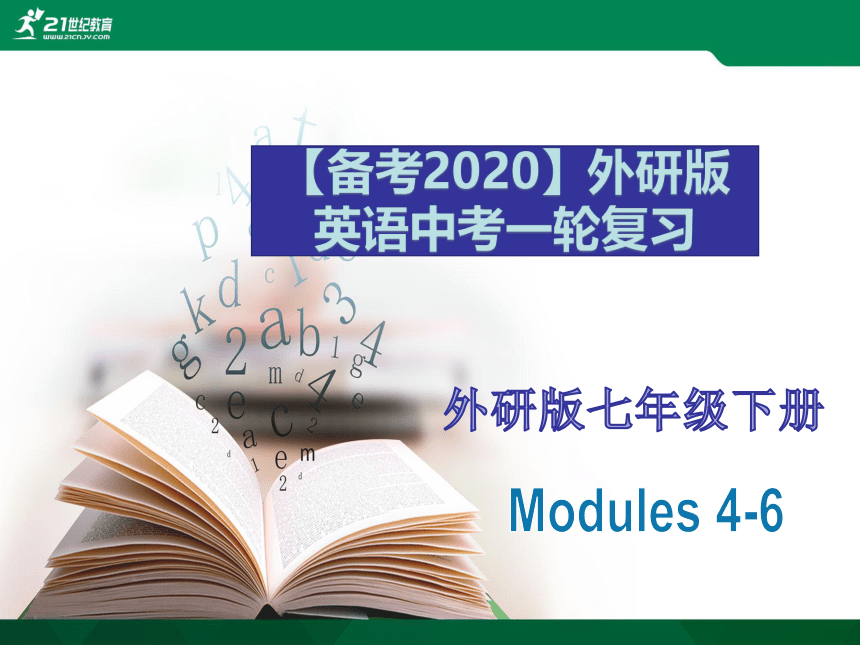 | |
| 格式 | pptx | ||
| 文件大小 | 2.7MB | ||
| 资源类型 | 试卷 | ||
| 版本资源 | 外研版 | ||
| 科目 | 英语 | ||
| 更新时间 | 2020-01-16 10:00:09 | ||
图片预览

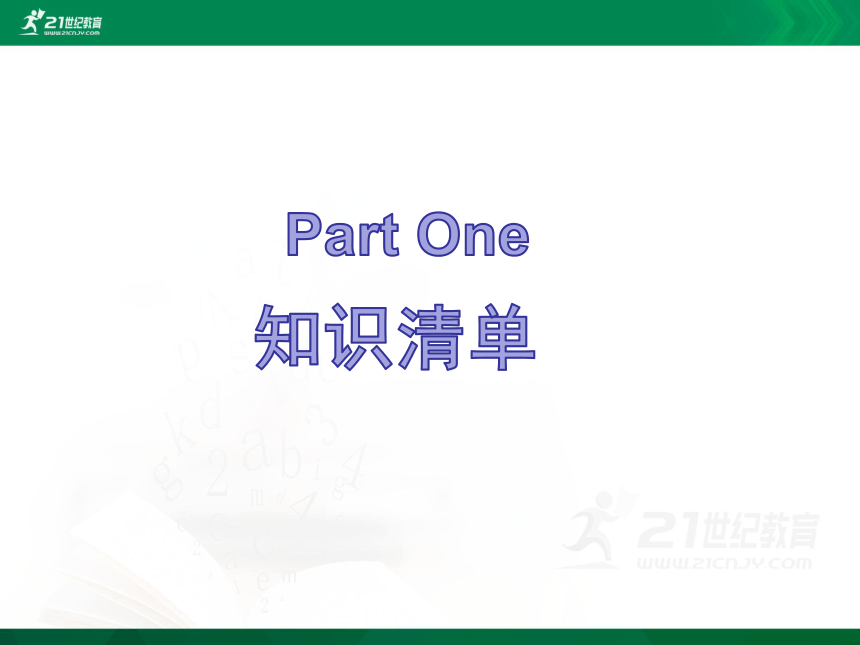
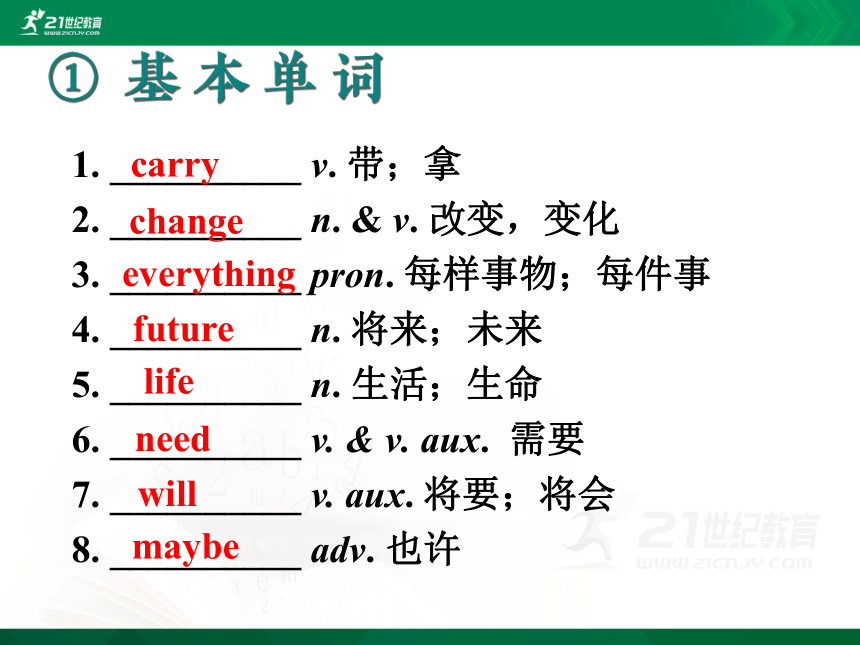
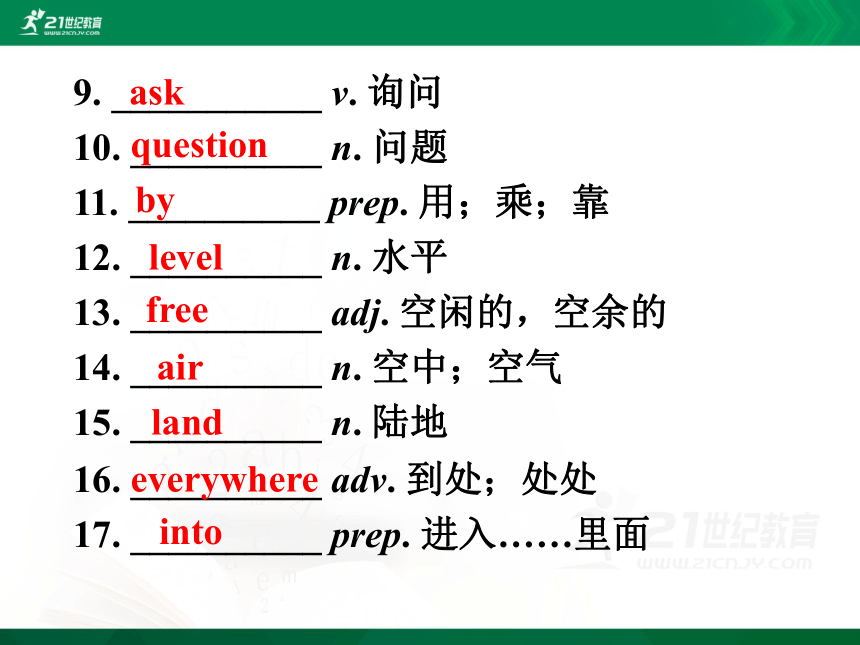
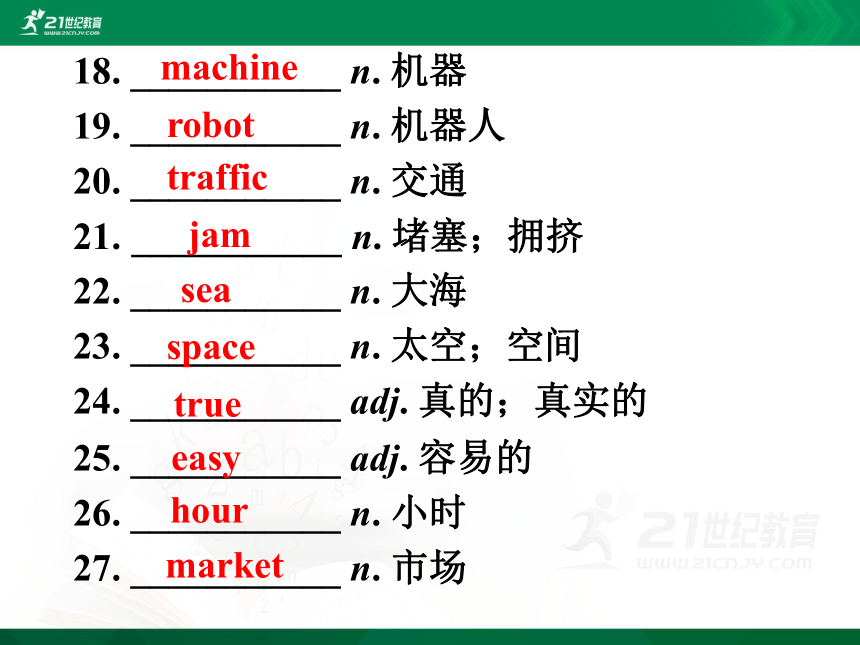
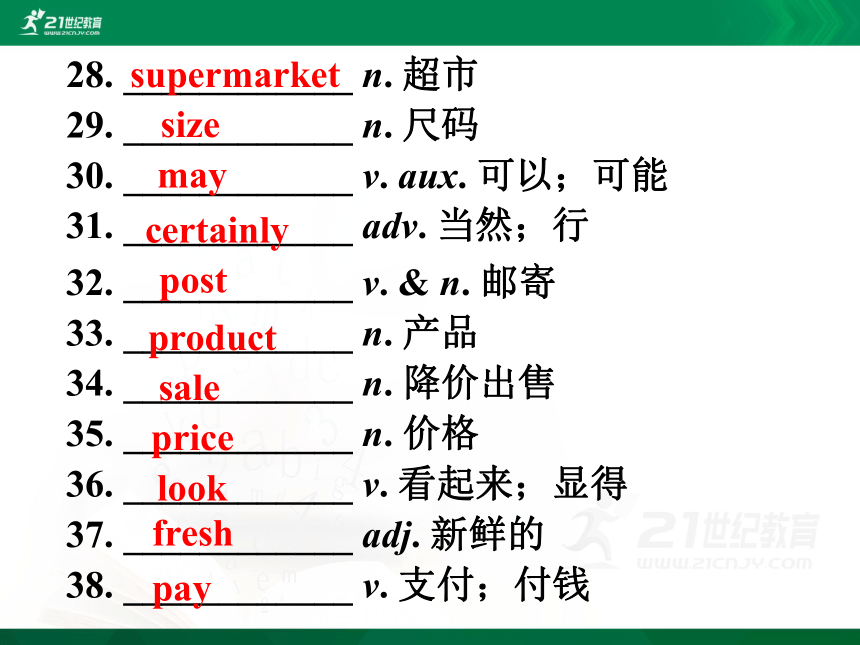
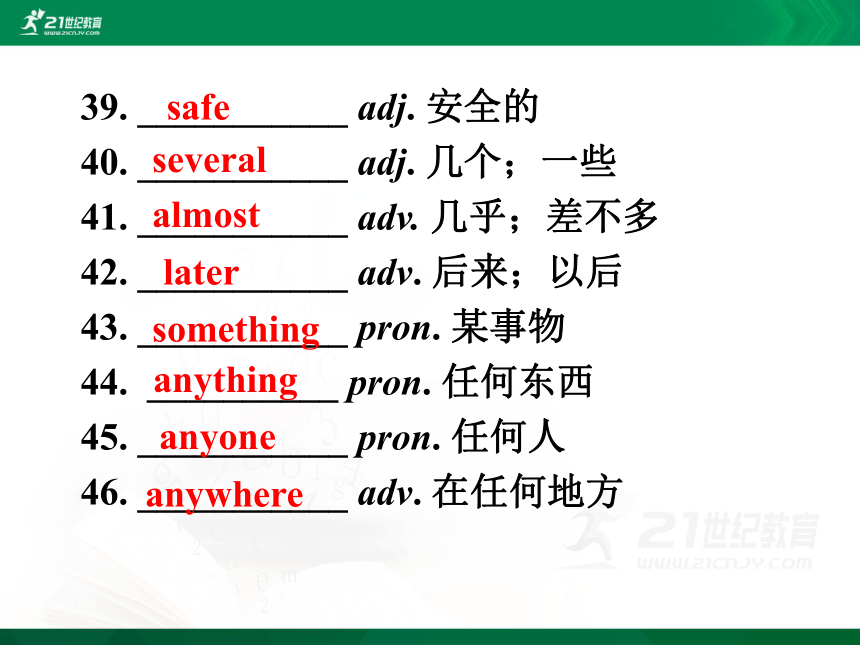
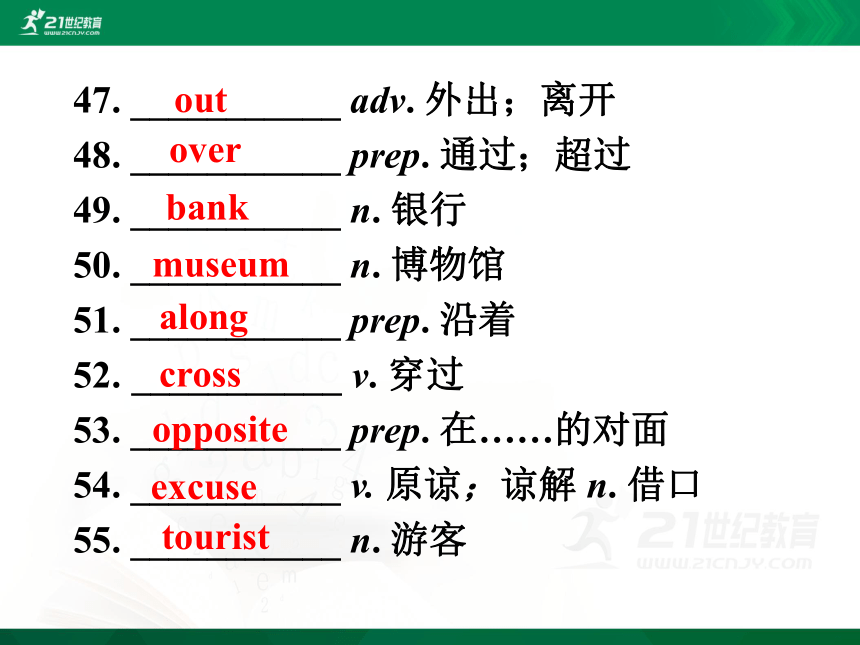
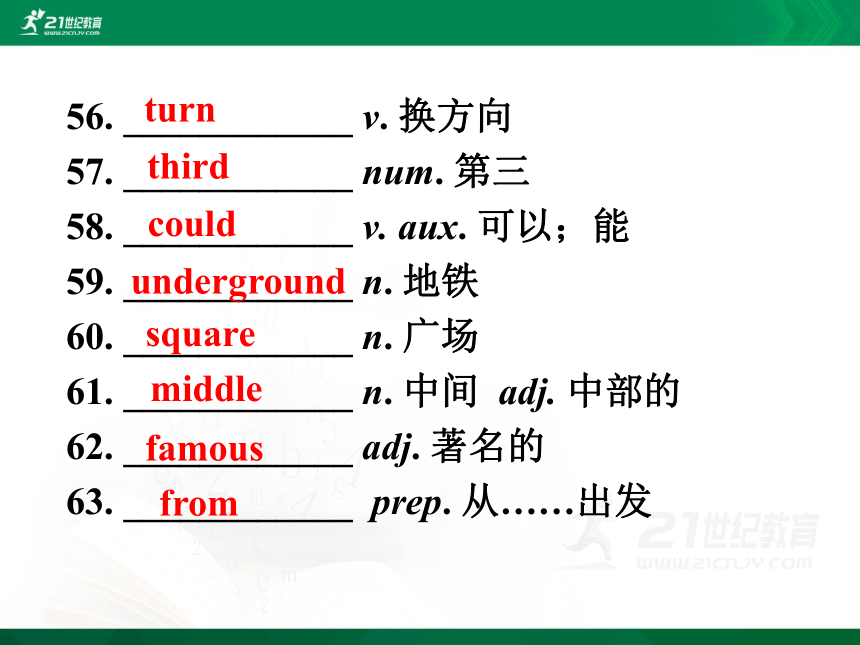
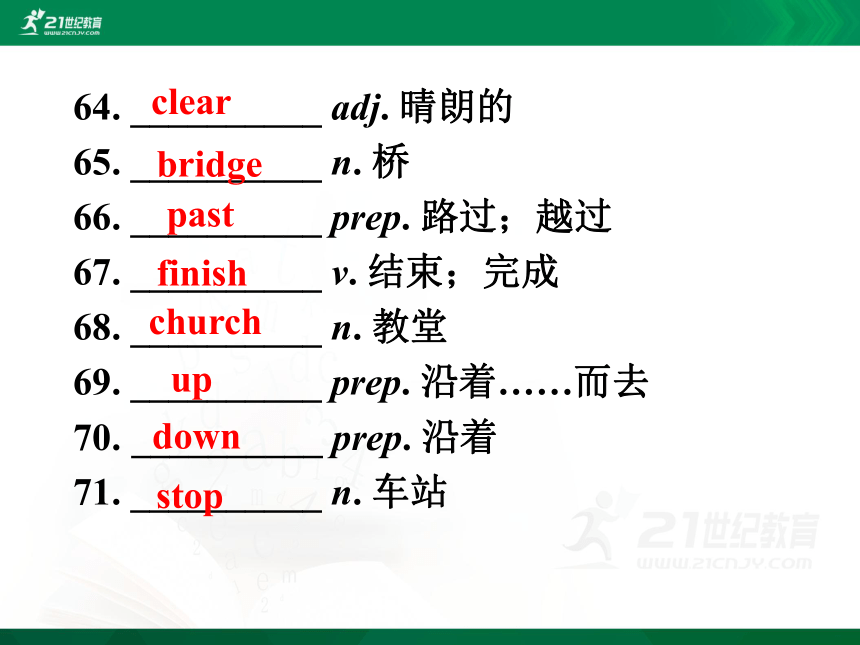
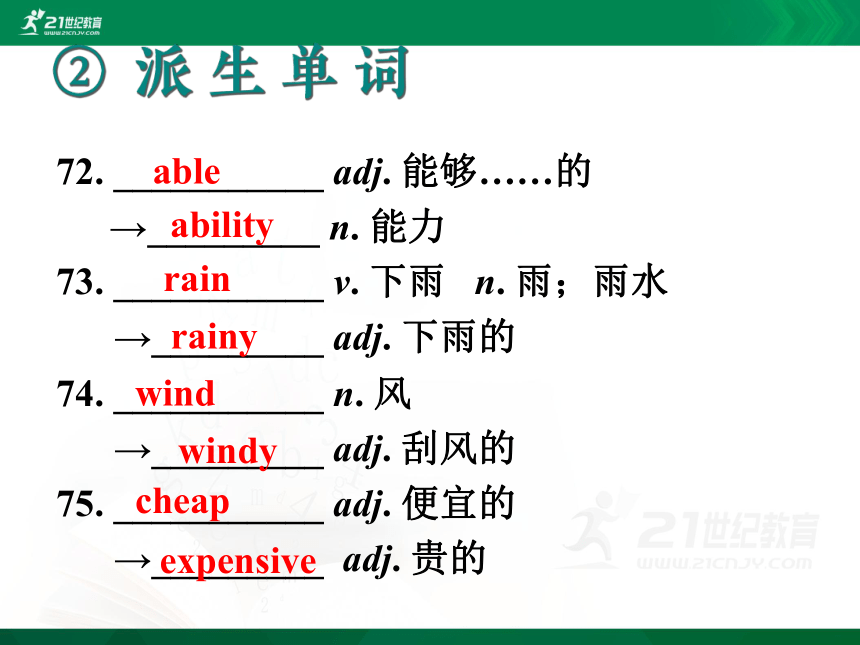
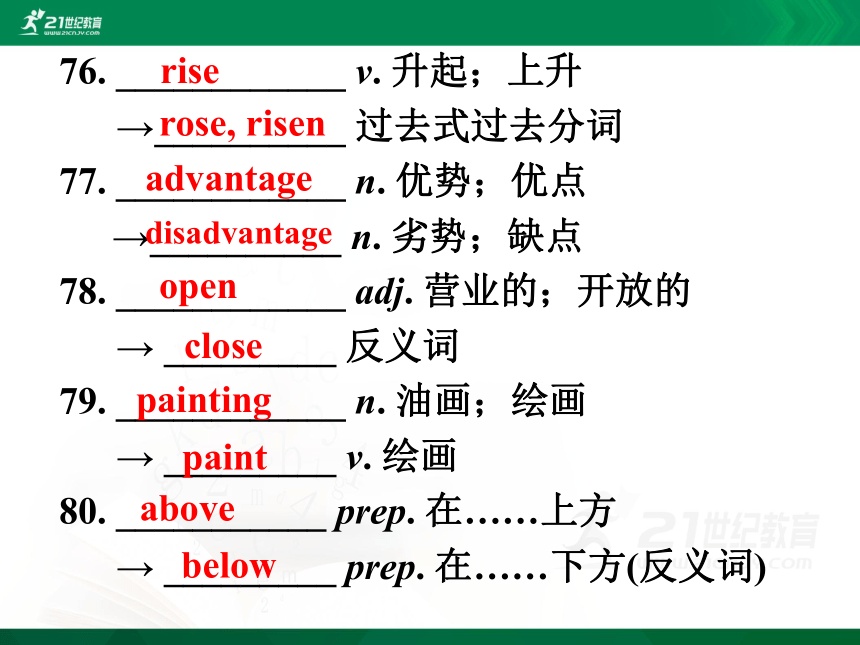
文档简介
(共117张PPT)
Modules 4-6
外研版七年级下册
【备考2020】外研版英语中考一轮复习
Part One
知识清单
1. __________ v. 带;拿
2. __________ n. & v. 改变,变化
3. __________ pron. 每样事物;每件事
4. __________ n. 将来;未来
5. __________ n. 生活;生命
6. __________ v. & v. aux. 需要
7. __________ v. aux. 将要;将会
8. __________ adv. 也许
carry
change
everything
future
life
need
will
maybe
9. ___________ v. 询问
10. __________ n. 问题
11. __________ prep. 用;乘;靠
12. __________ n. 水平
13. __________ adj. 空闲的,空余的
14. __________ n. 空中;空气
15. __________ n. 陆地
ask
question
by
level
free
air
land
16. __________ adv. 到处;处处
17. __________ prep. 进入……里面
everywhere
into
18. ___________ n. 机器
19. ___________ n. 机器人
20. ___________ n. 交通
21. ___________ n. 堵塞;拥挤
22. ___________ n. 大海
23. ___________ n. 太空;空间
24. ___________ adj. 真的;真实的
machine
robot
traffic
jam
sea
space
true
25. ___________ adj. 容易的
26. ___________ n. 小时
27. ___________ n. 市场
easy
hour
market
28. ____________ n. 超市
29. ____________ n. 尺码
30. ____________ v. aux. 可以;可能
31. ____________ adv. 当然;行
supermarket
size
may
certainly
32. ____________ v. & n. 邮寄
33. ____________ n. 产品
34. ____________ n. 降价出售
35. ____________ n. 价格
36. ____________ v. 看起来;显得
37. ____________ adj. 新鲜的
38. ____________ v. 支付;付钱
post
product
sale
price
look
fresh
pay
39. ___________ adj. 安全的
40. ___________ adj. 几个;一些
41. ___________ adv. 几乎;差不多
42. ___________ adv. 后来;以后
43. ___________ pron. 某事物
44. __________ pron. 任何东西
45. ___________ pron. 任何人
46. ___________ adv. 在任何地方
safe
several
almost
later
something
anything
anyone
anywhere
47. ___________ adv. 外出;离开
48. ___________ prep. 通过;超过
49. ___________ n. 银行
50. ___________ n. 博物馆
51. ___________ prep. 沿着
52. ___________ v. 穿过
53. ___________ prep. 在……的对面
54. ___________ v. 原谅;谅解 n. 借口
55. ___________ n. 游客
out
over
bank
museum
along
cross
opposite
excuse
tourist
56. ____________ v. 换方向
57. ____________ num. 第三
58. ____________ v. aux. 可以;能
59. ____________ n. 地铁
60. ____________ n. 广场
61. ____________ n. 中间 adj. 中部的
62. ____________ adj. 著名的
63. ____________ prep. 从……出发
turn
third
could
underground
square
middle
famous
from
64. __________ adj. 晴朗的
65. __________ n. 桥
66. __________ prep. 路过;越过
67. __________ v. 结束;完成
68. __________ n. 教堂
69. __________ prep. 沿着……而去
70. __________ prep. 沿着
71. __________ n. 车站
clear
bridge
past
finish
church
up
down
stop
72. ___________ adj. 能够……的
→_________ n. 能力
73. ___________ v. 下雨 n. 雨;雨水
→_________ adj. 下雨的
able
ability
rain
rainy
74. ___________ n. 风
→_________ adj. 刮风的
75. ___________ adj. 便宜的
→_________ adj. 贵的
wind
windy
cheap
expensive
76. ____________ v. 升起;上升
→__________ 过去式过去分词
77. ____________ n. 优势;优点
→__________ n. 劣势;缺点
78. ____________ adj. 营业的;开放的
→ _________ 反义词
79. ____________ n. 油画;绘画
→ _________ v. 绘画
80. ___________ prep. 在……上方
→ _________ prep. 在……下方(反义词)
rise
rose, risen
advantage
disadvantage
open
close
painting
paint
above
below
81. ___________ adj. 长的;长时间的
→_________ adj. 短的
82. ___________ adj. 沉的;繁重的
→_________ adj. 轻的;轻松的
long
heavy
light
short
1. ________________ 和;又;也
2. ________________ 在任何时间
3. ________________ 能够做某事
4. ________________ 通过因特网
5. ________________ 通过邮寄的方式
6. ___________ (希望、梦想等)实现,成真
7. _______________ 到达
as well
at any time
be able to do sth.
by Internet
by post
come true
get to
8. ____________________ 穿过
9. ____________________ 沿着……走
10. ___________________ 外出;游玩
11. ___________________ 将来
12. ___________________ 看起来新鲜
13. ___________________ 母亲节
14. ___________________ 不再……
15. ___________________
不仅……,而且……
go across
go along
go out
in the future
look fresh
Mother’s Day
not ... any more
not only ... but also ...
16. ____________________ 在晴朗的日子
17. ____________________ 总有一天
18. ____________________ ……之一
19. ____________________ 网上购物
20. ____________________ 为某物付钱
21. ____________________ 网上付款
22. ____________________ 邮政局
23. ____________________ 交通堵塞
24. ____________________ 试穿
on a clear day
one day
one of ...
online shopping
pay for sth.
pay over the Internet
post office
traffic jam
try on
25. _______________ 向左拐
26. _______________ 别急;稍等一会
27. _______________ 工作时间
28. _______________ 全年
29. _______________ 和;又;也
30. _______________ 给某人买某物
31. _______________ 半价
32. _______________ 在空中
33. _______________ 在网上
turn left
wait a minute
working hours
all year
as well
buy sth. for sb.
half price
on the Internet
in the air
1. Will schools be different in the future, Daming
2. In twenty years’ time, maybe there won’t be any schools!
3. What will life be like in the future
4. Here are some ideas.
5. What can I do for you
6. What color does she like
7. What size does she take
8. May I try it on
9. How much are they
10. What else would you like
11. That’ll be thirty yuan.
12. Excuse me! Can you tell me the way to
Wangfujing Dajie
13. How can I get there
14. Why not ask the policeman over there
15. Could you tell me how to get to the National Stadium
16. Go along the street and you'll see an underground station.
17. Have a nice day!
18. Welcome to this short tour of London.
Part Two
核心要点
1. carry v. 拿;带;搬运
【归纳】
carry back to 使回忆起
carry off 夺走,抢走,使……成功
carry on 继续,进行
carry out 进行实验实行计划完成任务
carry through 贯彻(计划),使(人)
渡过(困难、危险等)
carry 短语
【语境应用】完成下列句子。
1) The managers discussed the plan that they would like to _________ the next year.
2) Though tired and hungry, she _________ until she reached camp.
3) The sight of the place _______ her ______ her childhood.
4) His courage _______ him ________ his illness.
carried through
carry out
carried on
carried back to
fetch, carry, take & bring
take “带走”,把人或物带离说话人所在的地方。
bring “带来”,把人或物带到说话人所在的地方。
carry “搬运;携带”,不强调动作的方向。
fetch “(去)拿来”,到别处把人或物请来或拿来,有“去”的意思,又有“来”的意思。
【语境应用】用fetch, carry, take或bring的适
当形式填空。
1) Please _______ these books to the library.
2) Kim, please go to the reading room and _______ the English book for me.
3) Jerry _______ his cousin to my birthday party yesterday.
4) This bag is too heavy. Could you please _______ it for me
take
fetch
brought
carry
2. future n. 未来,将来;前途
【归纳】
in the future 在将来;在未来
(一般将来时的标志之一)
in future 今后;从今以后
(常用在表示命令或警示的句子中)
【语境应用】(2018四川泸州中考)
Robots _______ more heavy work for us in the future.
A will do B did
C have done D were doing
A
3. need v. & v. aux. 需要
【归纳】
1) need用作实义动词时,有人称,时态和数的变化,后接名词、代词或带to的动词不定式。否定式和疑问式需借助助动词do/does。
2) need作情态动词时,没有人称和数的变化,后接动词原形,主要用于否定句和疑问句中。
【语境应用】将下列汉语句子翻译成英语。
(1) 他需要知道这件事吗?
Does he need to know the thing /
Need he know the thing
(2) 你不需要这么早来这儿。
You needn’t come here so early. / You
don’t need to come here so early.
(3) 我们需要更多的信息。
We need more information.
4. rise vi. (日月星辰等)升起;工资上涨;水位上升;起床
读音 词性 语义
rise /raiz/ vi. 上升;升起;上涨
raise /reiz/ vt. 举起;抬起;饲养;筹集
rise & raise
【语境应用】翻译句子。
1) The moon rises.
月亮升起了。
2) We are surprised that the price of the house
is rising so rapidly.
房价上涨的这么快,我们感到很吃惊。
3) He raised his head and looked at the
blackboard.
他抬起头看着黑板。
4) His mother raised many ducks on the farm.
他妈妈在农场养着很多鸭子。
5) They are raising money for Project Hope.
他们正在为希望工程筹钱。
5. take v. 花费;买;乘,坐;带走;服用
【归纳】
It takes sb. some time to do sth.
做某事花费某人多少时间
take a plane / a bus / a train / a walk
乘飞机 / 公共汽车/ 火车/ 步行
take away 拿走
I’ll take it. 我买了。(take相当于buy)
take the medicine 喝药
take归纳
【语境应用】根据汉语意思完成句子。
1) 从家到学校要花费我30分钟。
It _____ me thirty minutes _______ to the school from my home.
2) 请把垃圾带走。
Please _____ the rubbish _______.
3) 我通常乘火车去太原。
I usually ___________ to Taiyuan.
takes
to get
take away
take a train
4) 你应该一天吃三次药。
You should ______ the medicine three
times a day.
5) 这些花儿不错。我买下了。
The flowers are nice. I’ll __________.
take
take them
take 多表示“花时间”,主语可以是事或物。
pay 多表示“花钱”,主语是人,常和介词for搭配
spend 可以表示“花钱;花时间”,主语是人,常和介词on搭配
cost 多表示“花钱”,主语是物或事,可以跟双宾语
take, pay, spend, cost
【语境应用】
—How long does it take you to finish your
homework every day
—I usually ________ two hours on it.
A spend B pay C take
A
6. try v. 尝试;试穿;品尝
【归纳】
try on 试穿
try to do sth. 尽力做某事
try doing sth. 试着做某事
try one’s best to do sth. 尽力做某事
【拓展】
try n. 尝试
have a try 试试看
【语境应用】请根据汉语意思完成句子,每空一词。
1) 我们要尽力去做它。
We will ______ ______ ______ it.
2) 老师说:“再试一试。”
The teacher says, “______ again. ”
3) 我们将尽最大努力学好英语。
We will _______ ______ ______ to learn
English well.
try to do
Try
try our best
7. look v.
【归纳】
感官动词,表示“看起来;显得”,
后面跟形容词作表语。
实义动词,意为“看;瞧”。
后面接所看的人或物时,加介词at。
感官动词
look
看起来
sound 听起来
smell 闻起来
taste 尝起来
feel 感觉;摸起来
【拓展】常见感官动词小结
【语境应用】(2018四川乐山中考)
—What do you think of the fish soup
—Well, it ________ a bit salty.
A looks B smells C tastes
C
look like 看起来像
look the same 看起来一样
look out of ... 向……外看
look after 照料;照顾
look around / about 环视;环顾;四下查看
look for 寻找;寻求
look forward to 盼望;期待
look up to 抬头看;敬仰
look down upon / on 俯瞰;看不起
look up and down 上下打量
look through 快速查看;浏览
look 短语
8. advantage v. 有利条件;优势
【归纳】advantage 短语
take advantage of 利用
have an advantage over 比……有优势
to one’s advantage 对某人有利
【语境应用】根据汉语意思完成句子,每空一词。
1) 我要利用这次去日本旅行的机会,买我们
需要的东西。
I’ll ________ ________ ________ the trip to
Japan to buy things we need.
2) iPhone比其他手机有很大的优势。
iPhone has a big _________ ________ other
mobile phones.
take advantage of
advantage over
3) 我们的父母过去并没有我们现在享有的这
些有利条件。
Our parents didn’t have ________
__________ that we have.
4) 出国学习将对你有利。
It will be ________ ________ ________ to
study abroad.
the
advantages
to your advantage
9. receive vt. 收到(客观地“接受或收到) ;
接待;招待
receive & accept
receive 意为“收到;接到”,表示“无主动意识地收到”,强调客观收到,但并不意味着同意接受。
accept 意为“接受”,表示“有意识地接受”,强调主观接受。
【语境应用】根据句意,用accept或receive的
适当形式填空。
1) Rick ________ a warm welcome when he went to the new school.
2) Yesterday, Jack ________ an invitation from Mark and ________ it happily.
received
received
accepted
10. along prep. 沿着(表示沿着细长的线移
动,如道路、河流、海岸等)
adv. 向前
【归纳】
come along 出现;发生;来到
get along 相处
【语境应用】选出下列句子中划线单词的中文意思。
A. 向前 B. 沿着
1) They’re running slowly along the road.
__________________
2) He sang loudly as he walked along.
__________________
B. 沿着
A. 向前
11. across, through, over
across across的含义与on有关,暗示“穿过”的动作是在物体的表面上进行,表示从某个平面的一边移到另一边
through through的含义与in有关,暗示从某一物体的内部“穿过”。表示“穿过”树林、洞、门、窗、房间等时。均可用through
over over表示运动发生在物体正上方,并且不与物体接触
【注意】cross也表示“穿过;越过;横穿”,但它是动词,而across是介词。cross相当于go/walk across。
【语境应用】(2019青海中考)
The bright sunlight comes into the room ________ the window.
A through B across C past
A
1. be able to 能够,会,胜任
be able to & can都表示能力,有时可互换,但两者也有所区别:
can 用于一般现在时和一般过去时,过去式为could。没有人称和数的变化
be able to 根据句子需要可以用于更多时态
【语境应用】根据提示将下列汉语句子翻译
成英语。
1) 他妹妹会弹钢琴。(can)
His sister can play the piano.
2) 妈妈明天能回来。 (be able to)
Mum will be able to come back tomorrow.
3) 他会骑自行车。 (be able to)
He is able to ride a bicycle.
2. come true 变为现实;成为事实
主语通常为表示愿望或梦想的名词
【拓展】
come about 发生
come on 快点(用于催促、鼓励等)
come back 回来
come in 到达;流行
come out 出来;出版,发行
come up with 提出,想出;赶上
come
短语
【语境应用】
It’s the old man’s dream to go to Beijing. Can his dream _________
A go out B eat out
C come true D come on
C
3. not only…, but also… 不仅……;而且…… (连词词组)
连接两个并列成分。当连接两个并列的主语时,谓语动词要和邻近的主语在人称和数上保持一致。
【拓展】
either ... or ...
或者……或者……,不是……就是……
neither ... nor ... 既不……也不……
连接两个并列成分作主语时,谓语动词常常 与邻近的主语在人称和数上保持一致。
both ... and ...
……和……都,既……又……
连接两个并列成分作主语时,谓语动词用复数形式。
【语境应用】翻译句子。
汤姆不仅喜欢吃苹果,还喜欢吃香蕉。
Tom likes to eat not only apples but also bananas.
琳达和安今天早上上学都迟到了。
Both Linda and Ann were late for school this morning.
1. In twenty year’s time, maybe there won’t be any schools!
“in + 一段时间”表示“一段时间之后”,常用于将来时。可以用how soon来提问。
【语境应用】
His father will get back _______ half an hour.
A in B at C on D for
A
maybe是由“may + be”构成的合成词,意为“也许”,表示可能性。
maybe 为副词。在句中作状语,相当于perhaps,常位于句首。
may be 为一个完整的谓语形式,与后面所接内容构成系表结构。
maybe & may be
2. Excuse me! Can you tell me the way to Wangfujing Dajie
本句是问路的常见用语,结构是“Can you tell me the way to + 地点?”
【拓展】问路时可以使用的表达方式:
Excuse me! Where is + 地点
Excuse me! How can I get to + 地点
Could you tell me how to get to + 地点
Can you tell me how I can get to + 地点
【语境应用】
—Excuse me, __________________
—It’s next to Wanda Cinema.
A when is the movie on
B what is your mother
C who is the girl under the tree
D where is the nearest bookshop
D
3. Why not ask the policeman over there
why not + 动词原形?= Why don’t you + 动词原形?
“why not… ” 在口语中应用很普遍,其语气较随和,意为“为什么不……呢?”。用语提出意见或建议。
【语境应用】
—Why not _________ out to play football
—Good idea. Let’s go.
A going B go C goes D to go
B
4. Next to the bridge is the Tower of London.
这是一个倒装句,表示强调。
e.g. Near the house is a small garden.
There comes the school bus.
【语境应用】根据汉语意思完成下列句子。
1) 树底下是我的奶奶。
Under the tree _________________.
2) 医院旁边是一家银行。
Next to the hospital _________.
is my grandmother
is a bank
5. When you get off the boat, go past the station and walk along the street.
When you are tired是一个状语从句。when可引导状语从句, 意思是“……的时候”。
【语境应用】根据汉语意思完成句子。
1) 天冷的时候穿上这件外套。
Wear the coat ________________.
2) 写作业的时候把门关上。
_______________________________,
close the door.
when it’s cold
When you’re doing your homework
6. May I try it on
may v. aux. 可以;可能
可以用来征求对方意见,表示说话人同意、许可。情态动词may还可以用来表达推测的语气,此时may可以翻译成“可能;也许”。may和must都可以用在肯定句中表推测,但may表示的推测语气没有must强烈。
May I ... 表示请求对方许可,口语性比较强,其答语也较灵活,但要根据实际情况作答,其否定回答常用can’t 或mustn’t。
【语境应用】
—Shirley, will you ride to school this
afternoon
—I’m not sure. It _________ rain.
A can B may C need D must
B
Part Three
语法要点
一般将来时:will (Module 4)
如果要描述未来的事情或表达对将来的预测等,可用“will+动词原形”,其中will没有人称和数的变化。常有tomorrow, next time, in a few days, next Monday, in the future等表示将来的时间状语。如:
We will visit England in a few days.
will可与there be句型连用,构成There will be ... ,表示“将有……”。如:
There will be a new school in the area next year.
以疑问词开头,对句中某一成分提问的句子叫特殊疑问句。不同的疑问词用来询问不同的对象。疑问词包括疑问代词和疑问副词。
特殊疑问句 (Module 5)
疑问词 提问对象 疑问词 提问对象
what 事物、职业、动作 how much 价格、不可数名词的数量
what class 班级 how far 距离
what grade 年级 how heavy 重量
what day 星期几 how wide 宽度
what time 时间点 how tall / high 身高 / 高度
what color 颜色 how old 年龄
what language 语言 when 时间
how 方式、身体状况 where 地点
how long 时间段 which 一个范围内的人或物进行选择
how often 频率 who 人(作主语或宾语),作宾语时还可用whom
how soon 时间(in+时间段) whose 所属关系
how many 可数名词的数量 why 原因
特殊疑问句的结构是“疑问词(不作主语)+一般疑问句句式”。当对主语或修饰主语的定语提问时,用陈述句语序。如:
How long have you studied it
Who is drawing
Whose brother likes dancing
回答特殊疑问句时不能使用yes或no,而要对所询问的对象有针对地回答。如:
—What grade are you in
—I’m in Grade Nine.
表示位置关系的介词称为方位介词。常见的方位介词有:in, on, over, above, under, below, near, beside, next to等。
表示方位的介词 (Module 6)
in表示“在……里面”;on表示“在……上面”,通常指两个物体的表面是相互接触的。
between意为“在……之间”,多指两者之间,常用结构为between ... and ... 。among一般用于三个或三个以上的人或物之间。
over表示“在……上方”,表示垂直的上方或正上方。 其反义词是under,它表示“在……下方”,主要表示垂直在下的正下方。这两个词都指两个物体之间互不接触。
above常笼统地表示一个物体高于另一个物体,两个物体相互不接触也不垂直。
below则指位置低于某物或在某物的下方,但不一定在正下方。
next to表示“在……旁边”,指两物之间没有其它东西;near表示“在……附近”。
behind表示“在……后面”,其反义短语是in front of。
on the left / right of意为“在……左边/右边”。
in front of与in the front of都表示“在……前面”,in front of 主要是指在一个范围之外的前边,而 in the front of 侧重指在一个范围之内的前部。
1. — I’ve never seen Mr. Taylor before.
— Don’t worry. I ______ him to you before
the meeting. (2019江西)
A. will introduce B. Introduced
C. have introduced D. had introduced
2. Next week, each student in the class ______ a small gift from their teachers. (2019重庆A卷)
A. receives B. received
C. will receive D. has received
一般将来时:will
A
C
3. Nobody can predict what _______ in the
future. So enjoy your life.
(2018 新疆阜康米泉)
A. will happen B. Happen
C. have happen D. happen
4. —Do you know when Mrs. White _____ for
dinner this evening
—No, but I think she _____ when she is free.
(2018 黑龙江龙东)
A. will come; will come
B. will come; comes
C. comes; will come
A
B
5. We ____ a party for Kate. It’s supposed
to be a surprise.
(2018 江西)
A. were having B. had
C. will have D. have had
6. Michael _________ in a school in
Yunnan from February to June next
year.
(2018 上海中考)
A. teaches B. taught
C. will teach D. was teaching
C
C
特殊疑问句
1. —Dad, _______ can we reach Huangguoshu
Waterfall
—In about an hour. (2019四川眉山)
A. how long B. how soon
C. how often D. how far
2. — ________ do you sleep every day, Eric
— For about eight hours. (2019江苏宿迁)
A. How much B. How fast
C. How often D. How long
B
D
3. —________ dictionary is this It’s very nice.
—I think is Mary’s. (2019湖南怀化)
A. Who B. Whose C. Whom
B
4. —______ does Liu Chuanjian do
—He’s a pilot of Sichuan Airlines. He’s
a hero! (2018 福建A卷)
A. What B. Where C. When
A
5. — ______ times have you visited Gansu
Science Museum
— Only once.
(2018 甘肃兰州)
A. How often B. How many
C. How long D. How soon
6. — _______ do you like wolf warriorsⅡ
— Because it’s exciting.
(2018 黑龙江绥化)
A. Why B. What C. How
B
A
1. — Look, there is a cute bird, Mom.
— It flew into our kitchen _________ the
window just now, Alex. (2019四川凉山)
A. across B. through
C. above D. under
2. Let’s take a walk _______ the river after dinner, shall we (2019江苏无锡)
A. along B. through
C. upon D. over
方位介词
B
A
3. --Where is Kate
--She is sitting next _______ Lily.
(2018 广西柳州)
A. to B. in C. on
4. Let’s put the piano over there, ______
the wall.
(2018 江苏无锡)
A. above B. against C. across D. around
A
B
5. The river is very clear, we can even see the
fish swimming ______ it.
(2018 四川资阳)
A. in B. on C. to D. behind
6. In the picture, he sits ________ me, looking
very happy.
(2018 天津)
A. beside B. among C. up D. through
A
A
Part Four
交际用语
一、购物(Shopping)
1. —Can / May I help you / What can I do for
you
—I'd like to buy a T-shirt for my mum. / I'd
like some sausages.
2. —How many / much would you like
—Two and a half kilos / pounds, please.
3. What colour / size / kind would you like
4. What colour does she like
5. What size does she take
6. What about this one
7. Here's your change.
8. How much is it / are they
9. May I try it on
10. It's too big / small.
11. Sorry, it's too expensive.
12. Do you have any other colours / sizes /
kinds
13. That's fine. I'll take it.
14. What else would you like
15. That'll be thirty yuan.
16. Just have a look.
17. Well, I'll think about it.
18. Here's fifty-nine yuan.
二、问路(Asking the way)
1. — Excuse me. Where’s the National
Stadium
— It's over there. / It’s about 400 metres from here.
2. — Can you tell me the way to Wangfujing Dajie
— Go across Dong Chang’an Jie, go along the street and turn left at the third street on the left.
3. — Could you tell me how to get to the post office
— You can take a bus or a taxi.
4. — How can I get to the Green Park
— Sorry, I don’t know. I’m a stranger here.
5. —Excuse me. Which bus goes to the museum
—You can take the No. 10 bus.
A: Hi, Gao Shan. It's Saturday tomorrow.
(1)________
B: Yes, I am. Why
A: Would you like to go for a picnic with me
A. What a pity!
B. Yes, I'd love to.
C. Sorry, I'm very busy.
D. How will we get there
E. Are you free tomorrow
F. When and where shall we meet
G. What will the weather be like tomorrow
根据对话内容从方框中选择能填入空白处的最佳选项补全对话,其中有两项多余。
E
B: (2)________ Let's ask Liu Tao to go with us.
A: But Liu Tao will have to look after his
grandfather at home tomorrow.
B: (3)________ Where shall we go
A: What about Dragon Lake
A. What a pity!
B. Yes, I'd love to.
C. Sorry, I'm very busy.
D. How will we get there
E. Are you free tomorrow
F. When and where shall we meet
G. What will the weather be like tomorrow
B
A
B: Sounds good! (4)________
A: Let's take the underground.
B: OK. (5)________
A: Let's meet at 8:30 at the underground station.
B: OK. See you then.
A. What a pity!
B. Yes, I'd love to.
C. Sorry, I'm very busy.
D. How will we get there
E. Are you free tomorrow
F. When and where shall we meet
G. What will the weather be like tomorrow
D
F
Part Five
话题写作
居住环境——社区
【写作任务】(改编自2018河南书面表达)
每个人都生活在一个特定的环境。请以“What I like about where I live”为题,并根据以下要点和要求用英语写一篇短文,描述你的生活环境。
1. 要点:
1)你生活在什么样的环境;2)你喜欢这个环境的什么;3)你对这个环境有何期望。
2. 要求:
1)文中不得出现真实姓名和学校名称;2)词数80左右。
【思路点拔】
1. 定基调
体裁:说明文
时态:一般现在时
人称:以第一人称和第三人称为主
2. 谋布局、写句子
It's convenient to go anywhere I'd like to
I can take a walk or do exercise here after a busy day
A library with millions of books is in front of the supermarket / There is a library with millions of books in front of the supermarket
3. 巧衔接
① 介绍社区周边设施时,可以使用near, on the right of, across from, in front of这些表示方位的词,使文章条理,同时也给读者呈现出一个清晰的立体方位图,使读者印象深刻。
② 介绍完居住地优点时,要引出新的话题(存在
的问题)时,可以用however来承上启下;当
列举问题时,可以用for example来举例说
明。
4. 成篇章
What I like about where I live
I live in a big and beautiful community which lies in the center of the city. It's convenient to go anywhere I'd like to. And that is what I like most about my community. Also, I like the environment around here. Near my community, there is a big park where I can enjoy fresh air and clean water. I can take a walk or do exercise here after a busy day. On the right of the park is a five-star hotel with the best service. Across from the hotel, you can see a big supermarket.
It sells all kinds of safe vegetables and fresh fruit. A library with millions of books is in front of the supermarket. When I am free, I prefer to stay there as much as possible.
However, there are some problems here. For example, roads are narrow and cars are parked here and there, so there is always heavy traffic. If roads are wider and there are more parking lots, the traffic will be better.
5. 化“平凡”为“非凡”
① Across from the hotel, you can see a big supermarket. It sells all kinds of safe vegetables and fresh fruit.
→Across from the hotel is a big supermarket
which sells all kinds of safe vegetables and
fresh fruit.
② If roads are wider and there are more
parking lots, the traffic will be better.
→If roads are widened and more parking lots
built, the traffic will be better.
Part Six
巩固练习
Ⅰ. 根据语境从方框中选择恰当的单词填空,有的需要变换形式。
several, square, tourist, carry
1. I made ________ mistakes in the maths exam yesterday.
2. Can you help me to ________ this box to the
room
3. Look! There are many people dancing in the
________.
4. Lots of ________ come to visit my home town
every year.
several
carry
square
tourists
Ⅱ. 根据语境从方框中选择恰当的短语填空,有的需要变换形式,每个短语限用一次。
post office, Mother’s Day, online shopping, traffic jam
1. I'll make a meal for my mum on ________________.
2. I don't like shopping in shops. I like
________________.
3. Tom will go to the ________________ to buy
some stamps.
4. Yesterday Susan was late for school because
of the ________________.
Mother's Day
online shopping
post office
traffic jam
根据上句完成下句,使上下两句意思相同或相近,每空一词(含缩略形式)。
1. I have collected over 300 coins.
I have collected ________ ________ 300
coins.
2. Jerry likes playing football. He also likes
playing basketball.
Jerry likes playing football. He likes playing
basketball ________ ________.
more than
as well
3. Andy takes a bus to school every day.
Andy goes to school ________ ________ every
day.
4. Mary can play the piano.
Mary ________ ________ ________ play the
piano.
by bus
is able to
根据括号内的要求完成下列各题,每空一词(含缩略形式)。
1. They will climb the mountain this Sunday. (改为否定句)
They ________ ________ the mountain this
Sunday.
2. The best way to go travelling is by train. (对
划线部分提问)
________ ________ the best way to go
travelling
won't climb
What is
3. This school is very beautiful. (对划线部分提
问)
________ is this school ________
4. Jason needs to buy size L shorts. (对划线部
分提问)
________ ________ shorts does Jason need to
buy
What like
What size
阅读短文,从方框中选择恰当的单词并用其适当形式填空,使短文通顺,意思完整,每词限用一次,其中有两项多余。
difficult, kid, but, from, discover, pay, help, parent, though, raise, after, whether
Amiah Van Hill is a student at Hayden Meadows Elementary in Idaho, US. When she learned about families who couldn't afford to pay their (1)________ school lunch bills, she felt sad. She also wanted to know (2)________ any of her own classmates had the same problem.
kids'
whether
difficult, kid, but, from, discover, pay, help, parent, though, raise, after, whether
After some research, she and her parents (3)________ that some of her schoolmates' families owed (欠债) about $40 in unpaid lunches. The six-year-old wanted (4)________. Amiah and her little sister, Aria, held a lemonade stand (柠檬水摊位) called LEMONADE 4 LUNCH and raised the money in about an hour. (5)________ Amiah wasn't finished — she and her parents kept (6)________ money online,
discovered
to help
But
raising
difficult, kid, but, from, discover, pay, help, parent, though, raise, after, whether
and they held more lemonade stands. (7)________ a few months, they raised $23,000 to pay off school lunch debt (债务) throughout Amiah's school district (学区).
And now Amiah has got a bigger goal (目标): to (8)________ the bill for the whole state of Idaho, which means raising about $100,000. She hopes to encourage more kids and (9)________ to help others.
After
pay
parents
difficult, kid, but, from, discover, pay, help, parent, though, raise, after, whether
“It will be a very (10)________ goal to reach, but with my LEMONADE 4 LUNCH stands and your help, I think we can do it!” said Amiah. “No matter how old you are, you can make a difference.”
difficult
谢谢
21世纪教育网(www.21cnjy.com) 中小学教育资源网站
有大把高质量资料?一线教师?一线教研员?
欢迎加入21世纪教育网教师合作团队!!月薪过万不是梦!!
详情请看:
https://www.21cnjy.com/help/help_extract.php
Modules 4-6
外研版七年级下册
【备考2020】外研版英语中考一轮复习
Part One
知识清单
1. __________ v. 带;拿
2. __________ n. & v. 改变,变化
3. __________ pron. 每样事物;每件事
4. __________ n. 将来;未来
5. __________ n. 生活;生命
6. __________ v. & v. aux. 需要
7. __________ v. aux. 将要;将会
8. __________ adv. 也许
carry
change
everything
future
life
need
will
maybe
9. ___________ v. 询问
10. __________ n. 问题
11. __________ prep. 用;乘;靠
12. __________ n. 水平
13. __________ adj. 空闲的,空余的
14. __________ n. 空中;空气
15. __________ n. 陆地
ask
question
by
level
free
air
land
16. __________ adv. 到处;处处
17. __________ prep. 进入……里面
everywhere
into
18. ___________ n. 机器
19. ___________ n. 机器人
20. ___________ n. 交通
21. ___________ n. 堵塞;拥挤
22. ___________ n. 大海
23. ___________ n. 太空;空间
24. ___________ adj. 真的;真实的
machine
robot
traffic
jam
sea
space
true
25. ___________ adj. 容易的
26. ___________ n. 小时
27. ___________ n. 市场
easy
hour
market
28. ____________ n. 超市
29. ____________ n. 尺码
30. ____________ v. aux. 可以;可能
31. ____________ adv. 当然;行
supermarket
size
may
certainly
32. ____________ v. & n. 邮寄
33. ____________ n. 产品
34. ____________ n. 降价出售
35. ____________ n. 价格
36. ____________ v. 看起来;显得
37. ____________ adj. 新鲜的
38. ____________ v. 支付;付钱
post
product
sale
price
look
fresh
pay
39. ___________ adj. 安全的
40. ___________ adj. 几个;一些
41. ___________ adv. 几乎;差不多
42. ___________ adv. 后来;以后
43. ___________ pron. 某事物
44. __________ pron. 任何东西
45. ___________ pron. 任何人
46. ___________ adv. 在任何地方
safe
several
almost
later
something
anything
anyone
anywhere
47. ___________ adv. 外出;离开
48. ___________ prep. 通过;超过
49. ___________ n. 银行
50. ___________ n. 博物馆
51. ___________ prep. 沿着
52. ___________ v. 穿过
53. ___________ prep. 在……的对面
54. ___________ v. 原谅;谅解 n. 借口
55. ___________ n. 游客
out
over
bank
museum
along
cross
opposite
excuse
tourist
56. ____________ v. 换方向
57. ____________ num. 第三
58. ____________ v. aux. 可以;能
59. ____________ n. 地铁
60. ____________ n. 广场
61. ____________ n. 中间 adj. 中部的
62. ____________ adj. 著名的
63. ____________ prep. 从……出发
turn
third
could
underground
square
middle
famous
from
64. __________ adj. 晴朗的
65. __________ n. 桥
66. __________ prep. 路过;越过
67. __________ v. 结束;完成
68. __________ n. 教堂
69. __________ prep. 沿着……而去
70. __________ prep. 沿着
71. __________ n. 车站
clear
bridge
past
finish
church
up
down
stop
72. ___________ adj. 能够……的
→_________ n. 能力
73. ___________ v. 下雨 n. 雨;雨水
→_________ adj. 下雨的
able
ability
rain
rainy
74. ___________ n. 风
→_________ adj. 刮风的
75. ___________ adj. 便宜的
→_________ adj. 贵的
wind
windy
cheap
expensive
76. ____________ v. 升起;上升
→__________ 过去式过去分词
77. ____________ n. 优势;优点
→__________ n. 劣势;缺点
78. ____________ adj. 营业的;开放的
→ _________ 反义词
79. ____________ n. 油画;绘画
→ _________ v. 绘画
80. ___________ prep. 在……上方
→ _________ prep. 在……下方(反义词)
rise
rose, risen
advantage
disadvantage
open
close
painting
paint
above
below
81. ___________ adj. 长的;长时间的
→_________ adj. 短的
82. ___________ adj. 沉的;繁重的
→_________ adj. 轻的;轻松的
long
heavy
light
short
1. ________________ 和;又;也
2. ________________ 在任何时间
3. ________________ 能够做某事
4. ________________ 通过因特网
5. ________________ 通过邮寄的方式
6. ___________ (希望、梦想等)实现,成真
7. _______________ 到达
as well
at any time
be able to do sth.
by Internet
by post
come true
get to
8. ____________________ 穿过
9. ____________________ 沿着……走
10. ___________________ 外出;游玩
11. ___________________ 将来
12. ___________________ 看起来新鲜
13. ___________________ 母亲节
14. ___________________ 不再……
15. ___________________
不仅……,而且……
go across
go along
go out
in the future
look fresh
Mother’s Day
not ... any more
not only ... but also ...
16. ____________________ 在晴朗的日子
17. ____________________ 总有一天
18. ____________________ ……之一
19. ____________________ 网上购物
20. ____________________ 为某物付钱
21. ____________________ 网上付款
22. ____________________ 邮政局
23. ____________________ 交通堵塞
24. ____________________ 试穿
on a clear day
one day
one of ...
online shopping
pay for sth.
pay over the Internet
post office
traffic jam
try on
25. _______________ 向左拐
26. _______________ 别急;稍等一会
27. _______________ 工作时间
28. _______________ 全年
29. _______________ 和;又;也
30. _______________ 给某人买某物
31. _______________ 半价
32. _______________ 在空中
33. _______________ 在网上
turn left
wait a minute
working hours
all year
as well
buy sth. for sb.
half price
on the Internet
in the air
1. Will schools be different in the future, Daming
2. In twenty years’ time, maybe there won’t be any schools!
3. What will life be like in the future
4. Here are some ideas.
5. What can I do for you
6. What color does she like
7. What size does she take
8. May I try it on
9. How much are they
10. What else would you like
11. That’ll be thirty yuan.
12. Excuse me! Can you tell me the way to
Wangfujing Dajie
13. How can I get there
14. Why not ask the policeman over there
15. Could you tell me how to get to the National Stadium
16. Go along the street and you'll see an underground station.
17. Have a nice day!
18. Welcome to this short tour of London.
Part Two
核心要点
1. carry v. 拿;带;搬运
【归纳】
carry back to 使回忆起
carry off 夺走,抢走,使……成功
carry on 继续,进行
carry out 进行实验实行计划完成任务
carry through 贯彻(计划),使(人)
渡过(困难、危险等)
carry 短语
【语境应用】完成下列句子。
1) The managers discussed the plan that they would like to _________ the next year.
2) Though tired and hungry, she _________ until she reached camp.
3) The sight of the place _______ her ______ her childhood.
4) His courage _______ him ________ his illness.
carried through
carry out
carried on
carried back to
fetch, carry, take & bring
take “带走”,把人或物带离说话人所在的地方。
bring “带来”,把人或物带到说话人所在的地方。
carry “搬运;携带”,不强调动作的方向。
fetch “(去)拿来”,到别处把人或物请来或拿来,有“去”的意思,又有“来”的意思。
【语境应用】用fetch, carry, take或bring的适
当形式填空。
1) Please _______ these books to the library.
2) Kim, please go to the reading room and _______ the English book for me.
3) Jerry _______ his cousin to my birthday party yesterday.
4) This bag is too heavy. Could you please _______ it for me
take
fetch
brought
carry
2. future n. 未来,将来;前途
【归纳】
in the future 在将来;在未来
(一般将来时的标志之一)
in future 今后;从今以后
(常用在表示命令或警示的句子中)
【语境应用】(2018四川泸州中考)
Robots _______ more heavy work for us in the future.
A will do B did
C have done D were doing
A
3. need v. & v. aux. 需要
【归纳】
1) need用作实义动词时,有人称,时态和数的变化,后接名词、代词或带to的动词不定式。否定式和疑问式需借助助动词do/does。
2) need作情态动词时,没有人称和数的变化,后接动词原形,主要用于否定句和疑问句中。
【语境应用】将下列汉语句子翻译成英语。
(1) 他需要知道这件事吗?
Does he need to know the thing /
Need he know the thing
(2) 你不需要这么早来这儿。
You needn’t come here so early. / You
don’t need to come here so early.
(3) 我们需要更多的信息。
We need more information.
4. rise vi. (日月星辰等)升起;工资上涨;水位上升;起床
读音 词性 语义
rise /raiz/ vi. 上升;升起;上涨
raise /reiz/ vt. 举起;抬起;饲养;筹集
rise & raise
【语境应用】翻译句子。
1) The moon rises.
月亮升起了。
2) We are surprised that the price of the house
is rising so rapidly.
房价上涨的这么快,我们感到很吃惊。
3) He raised his head and looked at the
blackboard.
他抬起头看着黑板。
4) His mother raised many ducks on the farm.
他妈妈在农场养着很多鸭子。
5) They are raising money for Project Hope.
他们正在为希望工程筹钱。
5. take v. 花费;买;乘,坐;带走;服用
【归纳】
It takes sb. some time to do sth.
做某事花费某人多少时间
take a plane / a bus / a train / a walk
乘飞机 / 公共汽车/ 火车/ 步行
take away 拿走
I’ll take it. 我买了。(take相当于buy)
take the medicine 喝药
take归纳
【语境应用】根据汉语意思完成句子。
1) 从家到学校要花费我30分钟。
It _____ me thirty minutes _______ to the school from my home.
2) 请把垃圾带走。
Please _____ the rubbish _______.
3) 我通常乘火车去太原。
I usually ___________ to Taiyuan.
takes
to get
take away
take a train
4) 你应该一天吃三次药。
You should ______ the medicine three
times a day.
5) 这些花儿不错。我买下了。
The flowers are nice. I’ll __________.
take
take them
take 多表示“花时间”,主语可以是事或物。
pay 多表示“花钱”,主语是人,常和介词for搭配
spend 可以表示“花钱;花时间”,主语是人,常和介词on搭配
cost 多表示“花钱”,主语是物或事,可以跟双宾语
take, pay, spend, cost
【语境应用】
—How long does it take you to finish your
homework every day
—I usually ________ two hours on it.
A spend B pay C take
A
6. try v. 尝试;试穿;品尝
【归纳】
try on 试穿
try to do sth. 尽力做某事
try doing sth. 试着做某事
try one’s best to do sth. 尽力做某事
【拓展】
try n. 尝试
have a try 试试看
【语境应用】请根据汉语意思完成句子,每空一词。
1) 我们要尽力去做它。
We will ______ ______ ______ it.
2) 老师说:“再试一试。”
The teacher says, “______ again. ”
3) 我们将尽最大努力学好英语。
We will _______ ______ ______ to learn
English well.
try to do
Try
try our best
7. look v.
【归纳】
感官动词,表示“看起来;显得”,
后面跟形容词作表语。
实义动词,意为“看;瞧”。
后面接所看的人或物时,加介词at。
感官动词
look
看起来
sound 听起来
smell 闻起来
taste 尝起来
feel 感觉;摸起来
【拓展】常见感官动词小结
【语境应用】(2018四川乐山中考)
—What do you think of the fish soup
—Well, it ________ a bit salty.
A looks B smells C tastes
C
look like 看起来像
look the same 看起来一样
look out of ... 向……外看
look after 照料;照顾
look around / about 环视;环顾;四下查看
look for 寻找;寻求
look forward to 盼望;期待
look up to 抬头看;敬仰
look down upon / on 俯瞰;看不起
look up and down 上下打量
look through 快速查看;浏览
look 短语
8. advantage v. 有利条件;优势
【归纳】advantage 短语
take advantage of 利用
have an advantage over 比……有优势
to one’s advantage 对某人有利
【语境应用】根据汉语意思完成句子,每空一词。
1) 我要利用这次去日本旅行的机会,买我们
需要的东西。
I’ll ________ ________ ________ the trip to
Japan to buy things we need.
2) iPhone比其他手机有很大的优势。
iPhone has a big _________ ________ other
mobile phones.
take advantage of
advantage over
3) 我们的父母过去并没有我们现在享有的这
些有利条件。
Our parents didn’t have ________
__________ that we have.
4) 出国学习将对你有利。
It will be ________ ________ ________ to
study abroad.
the
advantages
to your advantage
9. receive vt. 收到(客观地“接受或收到) ;
接待;招待
receive & accept
receive 意为“收到;接到”,表示“无主动意识地收到”,强调客观收到,但并不意味着同意接受。
accept 意为“接受”,表示“有意识地接受”,强调主观接受。
【语境应用】根据句意,用accept或receive的
适当形式填空。
1) Rick ________ a warm welcome when he went to the new school.
2) Yesterday, Jack ________ an invitation from Mark and ________ it happily.
received
received
accepted
10. along prep. 沿着(表示沿着细长的线移
动,如道路、河流、海岸等)
adv. 向前
【归纳】
come along 出现;发生;来到
get along 相处
【语境应用】选出下列句子中划线单词的中文意思。
A. 向前 B. 沿着
1) They’re running slowly along the road.
__________________
2) He sang loudly as he walked along.
__________________
B. 沿着
A. 向前
11. across, through, over
across across的含义与on有关,暗示“穿过”的动作是在物体的表面上进行,表示从某个平面的一边移到另一边
through through的含义与in有关,暗示从某一物体的内部“穿过”。表示“穿过”树林、洞、门、窗、房间等时。均可用through
over over表示运动发生在物体正上方,并且不与物体接触
【注意】cross也表示“穿过;越过;横穿”,但它是动词,而across是介词。cross相当于go/walk across。
【语境应用】(2019青海中考)
The bright sunlight comes into the room ________ the window.
A through B across C past
A
1. be able to 能够,会,胜任
be able to & can都表示能力,有时可互换,但两者也有所区别:
can 用于一般现在时和一般过去时,过去式为could。没有人称和数的变化
be able to 根据句子需要可以用于更多时态
【语境应用】根据提示将下列汉语句子翻译
成英语。
1) 他妹妹会弹钢琴。(can)
His sister can play the piano.
2) 妈妈明天能回来。 (be able to)
Mum will be able to come back tomorrow.
3) 他会骑自行车。 (be able to)
He is able to ride a bicycle.
2. come true 变为现实;成为事实
主语通常为表示愿望或梦想的名词
【拓展】
come about 发生
come on 快点(用于催促、鼓励等)
come back 回来
come in 到达;流行
come out 出来;出版,发行
come up with 提出,想出;赶上
come
短语
【语境应用】
It’s the old man’s dream to go to Beijing. Can his dream _________
A go out B eat out
C come true D come on
C
3. not only…, but also… 不仅……;而且…… (连词词组)
连接两个并列成分。当连接两个并列的主语时,谓语动词要和邻近的主语在人称和数上保持一致。
【拓展】
either ... or ...
或者……或者……,不是……就是……
neither ... nor ... 既不……也不……
连接两个并列成分作主语时,谓语动词常常 与邻近的主语在人称和数上保持一致。
both ... and ...
……和……都,既……又……
连接两个并列成分作主语时,谓语动词用复数形式。
【语境应用】翻译句子。
汤姆不仅喜欢吃苹果,还喜欢吃香蕉。
Tom likes to eat not only apples but also bananas.
琳达和安今天早上上学都迟到了。
Both Linda and Ann were late for school this morning.
1. In twenty year’s time, maybe there won’t be any schools!
“in + 一段时间”表示“一段时间之后”,常用于将来时。可以用how soon来提问。
【语境应用】
His father will get back _______ half an hour.
A in B at C on D for
A
maybe是由“may + be”构成的合成词,意为“也许”,表示可能性。
maybe 为副词。在句中作状语,相当于perhaps,常位于句首。
may be 为一个完整的谓语形式,与后面所接内容构成系表结构。
maybe & may be
2. Excuse me! Can you tell me the way to Wangfujing Dajie
本句是问路的常见用语,结构是“Can you tell me the way to + 地点?”
【拓展】问路时可以使用的表达方式:
Excuse me! Where is + 地点
Excuse me! How can I get to + 地点
Could you tell me how to get to + 地点
Can you tell me how I can get to + 地点
【语境应用】
—Excuse me, __________________
—It’s next to Wanda Cinema.
A when is the movie on
B what is your mother
C who is the girl under the tree
D where is the nearest bookshop
D
3. Why not ask the policeman over there
why not + 动词原形?= Why don’t you + 动词原形?
“why not… ” 在口语中应用很普遍,其语气较随和,意为“为什么不……呢?”。用语提出意见或建议。
【语境应用】
—Why not _________ out to play football
—Good idea. Let’s go.
A going B go C goes D to go
B
4. Next to the bridge is the Tower of London.
这是一个倒装句,表示强调。
e.g. Near the house is a small garden.
There comes the school bus.
【语境应用】根据汉语意思完成下列句子。
1) 树底下是我的奶奶。
Under the tree _________________.
2) 医院旁边是一家银行。
Next to the hospital _________.
is my grandmother
is a bank
5. When you get off the boat, go past the station and walk along the street.
When you are tired是一个状语从句。when可引导状语从句, 意思是“……的时候”。
【语境应用】根据汉语意思完成句子。
1) 天冷的时候穿上这件外套。
Wear the coat ________________.
2) 写作业的时候把门关上。
_______________________________,
close the door.
when it’s cold
When you’re doing your homework
6. May I try it on
may v. aux. 可以;可能
可以用来征求对方意见,表示说话人同意、许可。情态动词may还可以用来表达推测的语气,此时may可以翻译成“可能;也许”。may和must都可以用在肯定句中表推测,但may表示的推测语气没有must强烈。
May I ... 表示请求对方许可,口语性比较强,其答语也较灵活,但要根据实际情况作答,其否定回答常用can’t 或mustn’t。
【语境应用】
—Shirley, will you ride to school this
afternoon
—I’m not sure. It _________ rain.
A can B may C need D must
B
Part Three
语法要点
一般将来时:will (Module 4)
如果要描述未来的事情或表达对将来的预测等,可用“will+动词原形”,其中will没有人称和数的变化。常有tomorrow, next time, in a few days, next Monday, in the future等表示将来的时间状语。如:
We will visit England in a few days.
will可与there be句型连用,构成There will be ... ,表示“将有……”。如:
There will be a new school in the area next year.
以疑问词开头,对句中某一成分提问的句子叫特殊疑问句。不同的疑问词用来询问不同的对象。疑问词包括疑问代词和疑问副词。
特殊疑问句 (Module 5)
疑问词 提问对象 疑问词 提问对象
what 事物、职业、动作 how much 价格、不可数名词的数量
what class 班级 how far 距离
what grade 年级 how heavy 重量
what day 星期几 how wide 宽度
what time 时间点 how tall / high 身高 / 高度
what color 颜色 how old 年龄
what language 语言 when 时间
how 方式、身体状况 where 地点
how long 时间段 which 一个范围内的人或物进行选择
how often 频率 who 人(作主语或宾语),作宾语时还可用whom
how soon 时间(in+时间段) whose 所属关系
how many 可数名词的数量 why 原因
特殊疑问句的结构是“疑问词(不作主语)+一般疑问句句式”。当对主语或修饰主语的定语提问时,用陈述句语序。如:
How long have you studied it
Who is drawing
Whose brother likes dancing
回答特殊疑问句时不能使用yes或no,而要对所询问的对象有针对地回答。如:
—What grade are you in
—I’m in Grade Nine.
表示位置关系的介词称为方位介词。常见的方位介词有:in, on, over, above, under, below, near, beside, next to等。
表示方位的介词 (Module 6)
in表示“在……里面”;on表示“在……上面”,通常指两个物体的表面是相互接触的。
between意为“在……之间”,多指两者之间,常用结构为between ... and ... 。among一般用于三个或三个以上的人或物之间。
over表示“在……上方”,表示垂直的上方或正上方。 其反义词是under,它表示“在……下方”,主要表示垂直在下的正下方。这两个词都指两个物体之间互不接触。
above常笼统地表示一个物体高于另一个物体,两个物体相互不接触也不垂直。
below则指位置低于某物或在某物的下方,但不一定在正下方。
next to表示“在……旁边”,指两物之间没有其它东西;near表示“在……附近”。
behind表示“在……后面”,其反义短语是in front of。
on the left / right of意为“在……左边/右边”。
in front of与in the front of都表示“在……前面”,in front of 主要是指在一个范围之外的前边,而 in the front of 侧重指在一个范围之内的前部。
1. — I’ve never seen Mr. Taylor before.
— Don’t worry. I ______ him to you before
the meeting. (2019江西)
A. will introduce B. Introduced
C. have introduced D. had introduced
2. Next week, each student in the class ______ a small gift from their teachers. (2019重庆A卷)
A. receives B. received
C. will receive D. has received
一般将来时:will
A
C
3. Nobody can predict what _______ in the
future. So enjoy your life.
(2018 新疆阜康米泉)
A. will happen B. Happen
C. have happen D. happen
4. —Do you know when Mrs. White _____ for
dinner this evening
—No, but I think she _____ when she is free.
(2018 黑龙江龙东)
A. will come; will come
B. will come; comes
C. comes; will come
A
B
5. We ____ a party for Kate. It’s supposed
to be a surprise.
(2018 江西)
A. were having B. had
C. will have D. have had
6. Michael _________ in a school in
Yunnan from February to June next
year.
(2018 上海中考)
A. teaches B. taught
C. will teach D. was teaching
C
C
特殊疑问句
1. —Dad, _______ can we reach Huangguoshu
Waterfall
—In about an hour. (2019四川眉山)
A. how long B. how soon
C. how often D. how far
2. — ________ do you sleep every day, Eric
— For about eight hours. (2019江苏宿迁)
A. How much B. How fast
C. How often D. How long
B
D
3. —________ dictionary is this It’s very nice.
—I think is Mary’s. (2019湖南怀化)
A. Who B. Whose C. Whom
B
4. —______ does Liu Chuanjian do
—He’s a pilot of Sichuan Airlines. He’s
a hero! (2018 福建A卷)
A. What B. Where C. When
A
5. — ______ times have you visited Gansu
Science Museum
— Only once.
(2018 甘肃兰州)
A. How often B. How many
C. How long D. How soon
6. — _______ do you like wolf warriorsⅡ
— Because it’s exciting.
(2018 黑龙江绥化)
A. Why B. What C. How
B
A
1. — Look, there is a cute bird, Mom.
— It flew into our kitchen _________ the
window just now, Alex. (2019四川凉山)
A. across B. through
C. above D. under
2. Let’s take a walk _______ the river after dinner, shall we (2019江苏无锡)
A. along B. through
C. upon D. over
方位介词
B
A
3. --Where is Kate
--She is sitting next _______ Lily.
(2018 广西柳州)
A. to B. in C. on
4. Let’s put the piano over there, ______
the wall.
(2018 江苏无锡)
A. above B. against C. across D. around
A
B
5. The river is very clear, we can even see the
fish swimming ______ it.
(2018 四川资阳)
A. in B. on C. to D. behind
6. In the picture, he sits ________ me, looking
very happy.
(2018 天津)
A. beside B. among C. up D. through
A
A
Part Four
交际用语
一、购物(Shopping)
1. —Can / May I help you / What can I do for
you
—I'd like to buy a T-shirt for my mum. / I'd
like some sausages.
2. —How many / much would you like
—Two and a half kilos / pounds, please.
3. What colour / size / kind would you like
4. What colour does she like
5. What size does she take
6. What about this one
7. Here's your change.
8. How much is it / are they
9. May I try it on
10. It's too big / small.
11. Sorry, it's too expensive.
12. Do you have any other colours / sizes /
kinds
13. That's fine. I'll take it.
14. What else would you like
15. That'll be thirty yuan.
16. Just have a look.
17. Well, I'll think about it.
18. Here's fifty-nine yuan.
二、问路(Asking the way)
1. — Excuse me. Where’s the National
Stadium
— It's over there. / It’s about 400 metres from here.
2. — Can you tell me the way to Wangfujing Dajie
— Go across Dong Chang’an Jie, go along the street and turn left at the third street on the left.
3. — Could you tell me how to get to the post office
— You can take a bus or a taxi.
4. — How can I get to the Green Park
— Sorry, I don’t know. I’m a stranger here.
5. —Excuse me. Which bus goes to the museum
—You can take the No. 10 bus.
A: Hi, Gao Shan. It's Saturday tomorrow.
(1)________
B: Yes, I am. Why
A: Would you like to go for a picnic with me
A. What a pity!
B. Yes, I'd love to.
C. Sorry, I'm very busy.
D. How will we get there
E. Are you free tomorrow
F. When and where shall we meet
G. What will the weather be like tomorrow
根据对话内容从方框中选择能填入空白处的最佳选项补全对话,其中有两项多余。
E
B: (2)________ Let's ask Liu Tao to go with us.
A: But Liu Tao will have to look after his
grandfather at home tomorrow.
B: (3)________ Where shall we go
A: What about Dragon Lake
A. What a pity!
B. Yes, I'd love to.
C. Sorry, I'm very busy.
D. How will we get there
E. Are you free tomorrow
F. When and where shall we meet
G. What will the weather be like tomorrow
B
A
B: Sounds good! (4)________
A: Let's take the underground.
B: OK. (5)________
A: Let's meet at 8:30 at the underground station.
B: OK. See you then.
A. What a pity!
B. Yes, I'd love to.
C. Sorry, I'm very busy.
D. How will we get there
E. Are you free tomorrow
F. When and where shall we meet
G. What will the weather be like tomorrow
D
F
Part Five
话题写作
居住环境——社区
【写作任务】(改编自2018河南书面表达)
每个人都生活在一个特定的环境。请以“What I like about where I live”为题,并根据以下要点和要求用英语写一篇短文,描述你的生活环境。
1. 要点:
1)你生活在什么样的环境;2)你喜欢这个环境的什么;3)你对这个环境有何期望。
2. 要求:
1)文中不得出现真实姓名和学校名称;2)词数80左右。
【思路点拔】
1. 定基调
体裁:说明文
时态:一般现在时
人称:以第一人称和第三人称为主
2. 谋布局、写句子
It's convenient to go anywhere I'd like to
I can take a walk or do exercise here after a busy day
A library with millions of books is in front of the supermarket / There is a library with millions of books in front of the supermarket
3. 巧衔接
① 介绍社区周边设施时,可以使用near, on the right of, across from, in front of这些表示方位的词,使文章条理,同时也给读者呈现出一个清晰的立体方位图,使读者印象深刻。
② 介绍完居住地优点时,要引出新的话题(存在
的问题)时,可以用however来承上启下;当
列举问题时,可以用for example来举例说
明。
4. 成篇章
What I like about where I live
I live in a big and beautiful community which lies in the center of the city. It's convenient to go anywhere I'd like to. And that is what I like most about my community. Also, I like the environment around here. Near my community, there is a big park where I can enjoy fresh air and clean water. I can take a walk or do exercise here after a busy day. On the right of the park is a five-star hotel with the best service. Across from the hotel, you can see a big supermarket.
It sells all kinds of safe vegetables and fresh fruit. A library with millions of books is in front of the supermarket. When I am free, I prefer to stay there as much as possible.
However, there are some problems here. For example, roads are narrow and cars are parked here and there, so there is always heavy traffic. If roads are wider and there are more parking lots, the traffic will be better.
5. 化“平凡”为“非凡”
① Across from the hotel, you can see a big supermarket. It sells all kinds of safe vegetables and fresh fruit.
→Across from the hotel is a big supermarket
which sells all kinds of safe vegetables and
fresh fruit.
② If roads are wider and there are more
parking lots, the traffic will be better.
→If roads are widened and more parking lots
built, the traffic will be better.
Part Six
巩固练习
Ⅰ. 根据语境从方框中选择恰当的单词填空,有的需要变换形式。
several, square, tourist, carry
1. I made ________ mistakes in the maths exam yesterday.
2. Can you help me to ________ this box to the
room
3. Look! There are many people dancing in the
________.
4. Lots of ________ come to visit my home town
every year.
several
carry
square
tourists
Ⅱ. 根据语境从方框中选择恰当的短语填空,有的需要变换形式,每个短语限用一次。
post office, Mother’s Day, online shopping, traffic jam
1. I'll make a meal for my mum on ________________.
2. I don't like shopping in shops. I like
________________.
3. Tom will go to the ________________ to buy
some stamps.
4. Yesterday Susan was late for school because
of the ________________.
Mother's Day
online shopping
post office
traffic jam
根据上句完成下句,使上下两句意思相同或相近,每空一词(含缩略形式)。
1. I have collected over 300 coins.
I have collected ________ ________ 300
coins.
2. Jerry likes playing football. He also likes
playing basketball.
Jerry likes playing football. He likes playing
basketball ________ ________.
more than
as well
3. Andy takes a bus to school every day.
Andy goes to school ________ ________ every
day.
4. Mary can play the piano.
Mary ________ ________ ________ play the
piano.
by bus
is able to
根据括号内的要求完成下列各题,每空一词(含缩略形式)。
1. They will climb the mountain this Sunday. (改为否定句)
They ________ ________ the mountain this
Sunday.
2. The best way to go travelling is by train. (对
划线部分提问)
________ ________ the best way to go
travelling
won't climb
What is
3. This school is very beautiful. (对划线部分提
问)
________ is this school ________
4. Jason needs to buy size L shorts. (对划线部
分提问)
________ ________ shorts does Jason need to
buy
What like
What size
阅读短文,从方框中选择恰当的单词并用其适当形式填空,使短文通顺,意思完整,每词限用一次,其中有两项多余。
difficult, kid, but, from, discover, pay, help, parent, though, raise, after, whether
Amiah Van Hill is a student at Hayden Meadows Elementary in Idaho, US. When she learned about families who couldn't afford to pay their (1)________ school lunch bills, she felt sad. She also wanted to know (2)________ any of her own classmates had the same problem.
kids'
whether
difficult, kid, but, from, discover, pay, help, parent, though, raise, after, whether
After some research, she and her parents (3)________ that some of her schoolmates' families owed (欠债) about $40 in unpaid lunches. The six-year-old wanted (4)________. Amiah and her little sister, Aria, held a lemonade stand (柠檬水摊位) called LEMONADE 4 LUNCH and raised the money in about an hour. (5)________ Amiah wasn't finished — she and her parents kept (6)________ money online,
discovered
to help
But
raising
difficult, kid, but, from, discover, pay, help, parent, though, raise, after, whether
and they held more lemonade stands. (7)________ a few months, they raised $23,000 to pay off school lunch debt (债务) throughout Amiah's school district (学区).
And now Amiah has got a bigger goal (目标): to (8)________ the bill for the whole state of Idaho, which means raising about $100,000. She hopes to encourage more kids and (9)________ to help others.
After
pay
parents
difficult, kid, but, from, discover, pay, help, parent, though, raise, after, whether
“It will be a very (10)________ goal to reach, but with my LEMONADE 4 LUNCH stands and your help, I think we can do it!” said Amiah. “No matter how old you are, you can make a difference.”
difficult
谢谢
21世纪教育网(www.21cnjy.com) 中小学教育资源网站
有大把高质量资料?一线教师?一线教研员?
欢迎加入21世纪教育网教师合作团队!!月薪过万不是梦!!
详情请看:
https://www.21cnjy.com/help/help_extract.php
